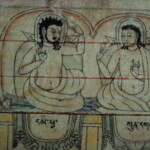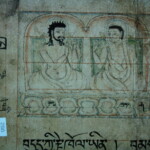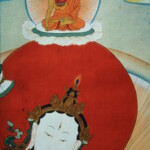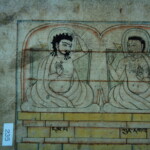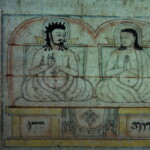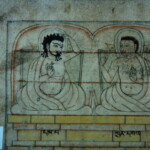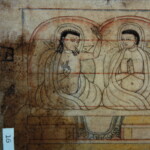Five-volume Tibetan text, with introduction by Barbara Nimri Aziz, 1979 originally published in Bhutan.
Among treasured documents carried form Tibet with refugees was a three volume illustrated, illuminated manuscript record of the teachings of Pha Dampa Sangyas, the 12 C. Black Yogi, originator of Zhi-je philosophy and practice, arrived in Tibet from India. Though famed, his center was a modest retreat at Dingri Lankgor where the manuscript was housed.
Aziz research into Dingri history and the story of the Langkor Nangten (relics), an orally transmitted account of PhaDampa’s history, led to a more extensive project culminating in the reproduction of this treasured text. Anthropologist Aziz, fluent in Tibetan, had several years of association with Thupten Choeling Monastery (and nunnery) in Solu-Khumbu, Nepal. Trusted by Trulshik Rinpoche the revered abbot, he invited her to photograph (on 35 mm film stock) the complete manuscript extending to hundreds of pages, an exercise undertaken in the monastery courtyard over the course of many weeks and under his attentive care.
The eminent Tibetologist E. Gene Smith confirmed the value of the text and worked with Aziz to have her photographic document copied, edited, then printed in Bhutan. Smith invited Aziz to prepare a short English introduction for inclusion in volume one of the five volumes in the traditional Tibetan format.
The original manuscript is safely hidden, while many reproductions of the original photographed copy are widely distributed, translated, and made available to scholars and Buddhist students. Among Aziz’ original photographs are close-ups of illustrations within the text, which we make available to readers.
Photos
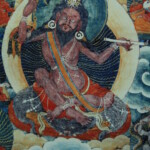
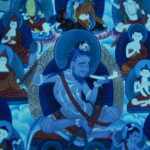
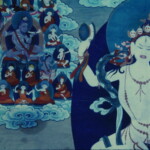
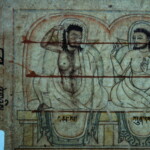
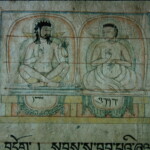
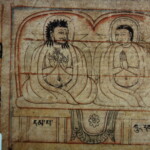
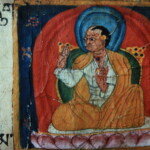
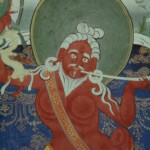
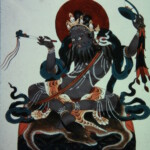
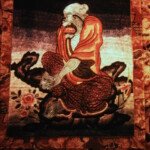
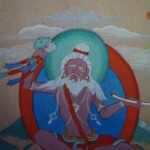
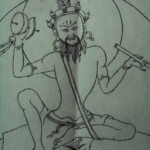
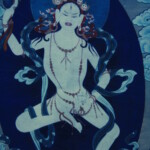
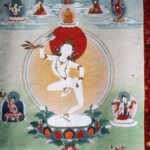
Excerpts
Excerpts (passages 1,2,3 and 22-26) from Pha Dampa’s hundred verses of advice to the people of Dingri (Tingri) from a recent translation
Homage to the teacher!
Fortunate practitioners gathered here in Tingri, listen!
Just as worn-out clothes can never again be made as new,
It’s no use seeing a doctor once you’re terminally ill;
You’ll have to go. We humans living on this earth
Are like streams and rivers flowing toward the ocean –
All living beings are heading for that single destination.
Now, like a small bird flying off from a treetop,
I, too, will not be here much longer; soon I must move on.
1
If you spend the present meaninglessly and leave with empty hands,
People of Tingri, a human life in the future will be very hard to find.
2
To apply yourselves with body, speech and mind to the sacred Teachings,
People of Tingri, is the best thing that you can do.
3
Give your very life, heart and soul to the Three Jewels [the Buddha, the Dharma, and the Sangha],
People of Tingri, and their blessings cannot but arise.
…………………………….. ………………………….
22
Your never-failing source of refuge is the teacher;
People of Tingri, carry him constantly on the crown of your head.
23
If your protection is the teacher, you’ll reach wherever you aspire to go;
People of Tingri, cultivate devotion as the fare you pay for the journey.
24
Those who get wealthy get miserly too;
People of Tingri, give generously without being partial.
25
Whoever gets power acts sinfully, too;
People of Tingri, abandon all desire for rank and power.
26
Those with rank and riches are never happy and at ease;
People of Tingri, get ready to claw at your chest in anguish.
Related Articles
Foreword by Barbara Nimri Aziz to Susan Muaddi Darraj Scheherazade’s Legacy: Arab and Arab American Women Writing, 2004 Inevitably, a time arrives in a people’s…
by Barbara Nimri Aziz Mine is not a list of new releases. I’m moving backwards–a positive move. That is to say, I’m not reading the…
Jan. 22/21 by BN Aziz Counterpunch.org “Man, it’s hard doing comedy”. What? That was Chris Rock on January 12th talking with Stephen Colbert. Two of…
by Barbara Nimri Aziz updated Dec. 2020 In a short obscure film clip from our mourned brother Anthony Shadid, the award winning writer spoke with…
by Barbara Nimri Aziz Dec 30, 2020 Counterpunch.org This film story by Sanaa Akroud is, like its title “Myopia”, just too simple to carry the…
by Barbara Nimri Aziz Counterpunch.org “The tractors came over the roads and into the fields, great crawlers moving like insects….They crawled over the ground, laying…

